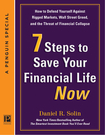
I received a call recently from a young entrepreneur. He has saved some money (around $50,000) and wanted to start investing. I asked him some questions and learned that he had three young children. His wife stayed at home to look after them. I asked him what would happen to his family if he died or became disabled. He told me they would be "in dire straits." I inquired about insurance. He had none.
I told him to contact an insurance agent, obtain life and disability insurance in an amount required to protect his family and to contact me once he knew the cost of the insurance. I never heard back from him, but I felt good about the advice I gave him. I was glad he didn't call a broker. If he did, there is little possibility they would have given him advice other than to begin an aggressive investing program (with them).
Investors who want to act responsibility and plan for retirement intelligently face a minefield of obstacles. At one end of the spectrum are brokers and advisers who are simply dishonest. You should make it a habit to check out the litigation releases on the webpage of Securities and Exchange Commission. Every week, you will find a litany of outrageous, fraudulent and illegal conduct.
Many brokers and advisers stay within legal constraints, but still lead you astray, often by selling high commission, complex products or by asserting they have the skill to engage in stock picking, market timing or manager fund picking, that will enable you to "beat the market." This pursuit of "alpha" (the excess return over a benchmark index) is the single biggest fallacy undermining your returns. It most commonly results in "negative alpha" (underperformance compared to the benchmark index). The result of this routine is the transfer of money from the pocket of those who make it to the pocket of those who manage it.
Nothing illustrates this point better than the current focus of the financial media on whether to "take your profits off the table," "stay invested" or "buy more stocks" now that the market has hit new highs. If you are having these discussions with your broker, you are headed in the wrong direction.
You should always be invested in a globally diversified portfolio of low-management fee index funds or passive funds in an asset allocation appropriate for you. If you are concerned about the market volatility, you should reduce your allocation to stocks.
The best way to cope with the minefield confronting you is to stop dealing with retail brokers whose interests are in conflict with yours. Then ignore the financial media which has a vested interest in instilling fear and anxiety.
Following these simple steps will fundamentally change the way you invest. It's long overdue.

